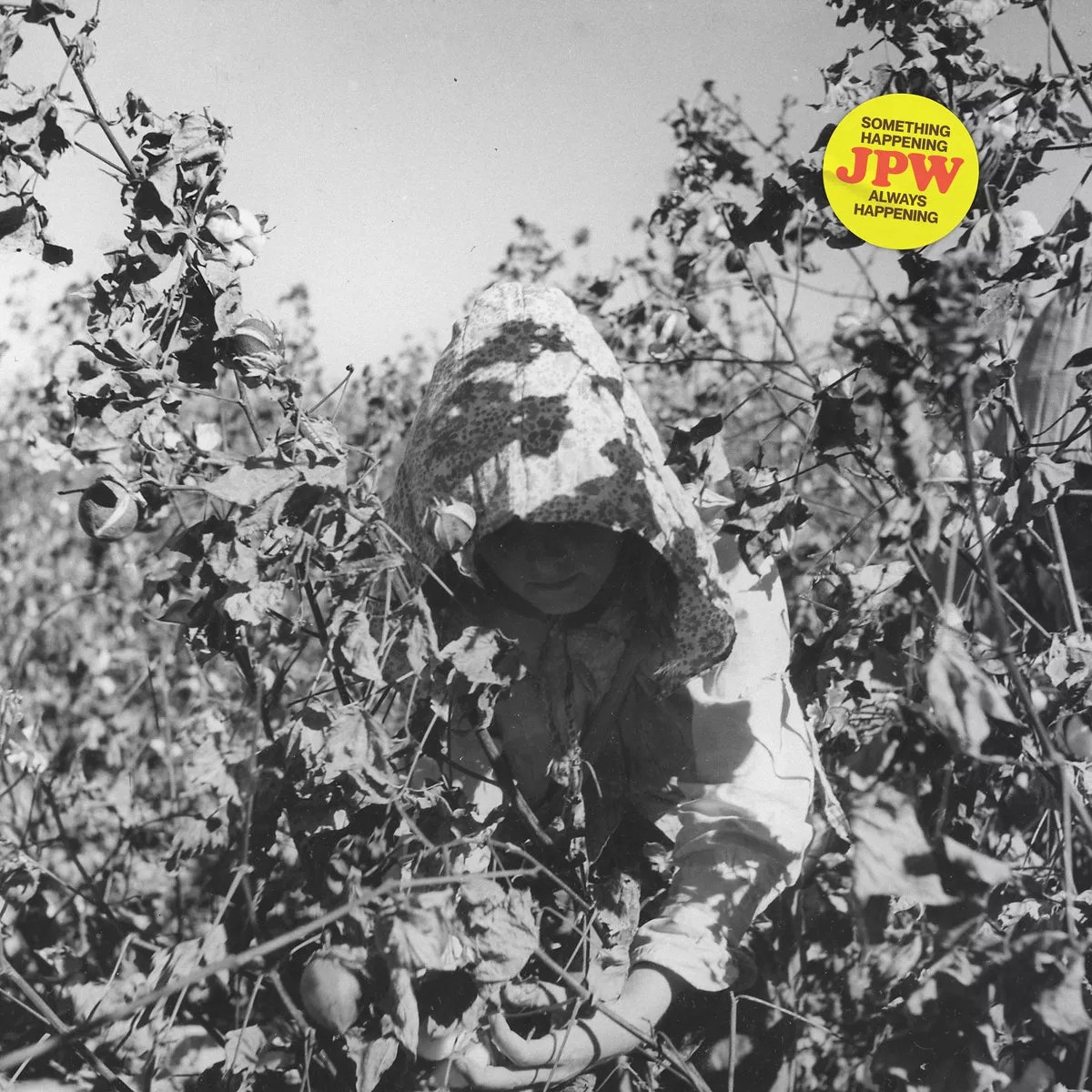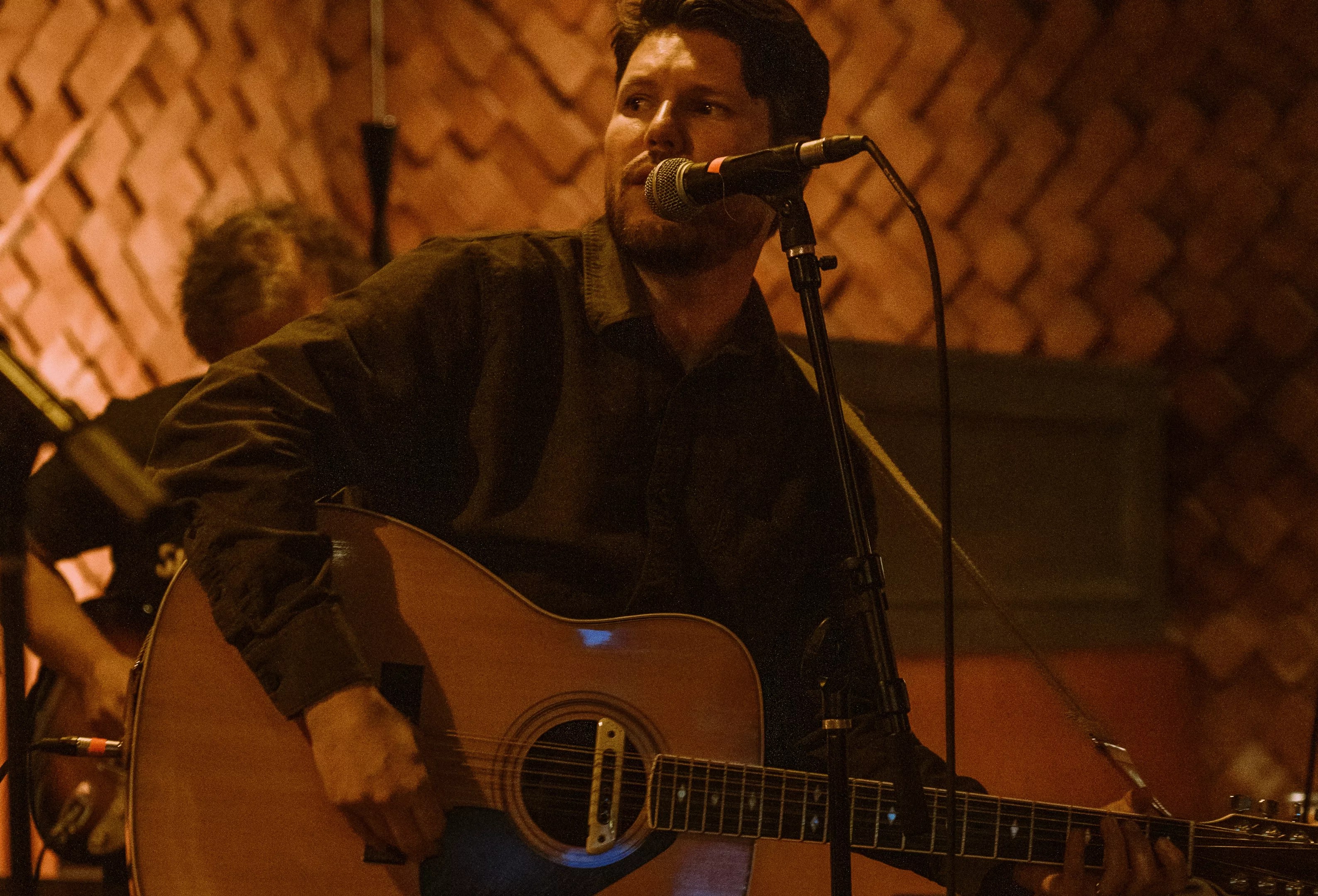
Fort Lowell Records

Audio By Carbonatix

Jason P. Woodbury performs as JPW in summer 2022.
Nadya Sanchez
When you talk of ecosystems, there’s this idea of “lynchpin” species. Those animals that are vital to sustaining a specific system; the capelin, for instance, serves this role for regions like the North Atlantic.
Without attempting to embarrass or hyperbolize, Jason P. Woodbury is our own capelin.
Since the mid-2000s, he’s done it all: musician (including KITIMOTO); record store employee (Zia); writer and editor (Phoenix New Times); and host (Wastoids and Aquarium Drunkard). He’s helped foster our robust local scene for years by applying his immense passion and deep curiosity. It’s a story worth exploring as Woodbury commences a new journey: a solo career as JPW.
Woodbury’s early love of music started, as it should, with Dave Matthews Band – until he quickly became enamored with punk. It’s a true snapshot of his lifelong, multifaceted obsession.
“Music was a thing I felt deeply connected to that was beyond a hobby or an interest,” he said recently at the Linger Longer Lounge. “It was pretty quick that I recognized that I’d become obsessed with the idea of it.”
At that time, Woodbury would make some lifelong connections, including Zane Gillum, who plays on JPW’s debut album, Something Happening / Always Happening. But it wasn’t long before Woodbury found his other great love: writing about music.
“I think that my relationship with [music] was less focused on me playing it all the time,” he said. “Although that was a big part of it. I also wanted to tell my friends what records they should be listening to.”
And, while he kept playing music for himself alongside pals like Gillum, Woodbury eventually gave up any “aspirations” for life as a writer and editor.
Then, of course, the world went and changed.
Woodbury said that as COVID-19 reared its head, he picked up his guitar more regularly. That led him to record an album with the aforementioned KITIMOTO, June’s truly excellent Vintage Smell. It was that solidarity that largely sparked the JPW project.
“I think it was the process of being in a band with friends and getting to add touches to songs and not have to be the sole songwriter,” he said. “It engaged a part of the creative side of my brain that I missed and that I hadn’t engaged so much.”
But it was different still. A decade-ish away, and his efforts to work through big ideas and emotions, pushed Woodbury into a new place musically.
“So what happened – maybe it’s getting older or maybe it’s devoting myself more or less to a kind of spiritual practice – but all of a sudden, when I started working on this record, I had a couple songs tumble out that were very, very spontaneous,” he said. “They felt like they came from someplace that wasn’t my head.”
He’s referring to cuts like “Cruel in Time” and “Wealth of the Canyon,” which exemplify the album’s overt sense of ease and a commitment to emotionality over technical prowess.
“They happened in a matter of just a couple of days,” Woodbury added. “They just came out and were recorded in ways I’d never recorded. I was utilizing loops and drum samples. I listened back to them, and I heard in them a quality that I’d just never been able to hear from my own music.”
To some extent, this wellspring of creation was a chance for Woodbury to counter what he’d taught himself as a professional writer/editor.
“When I’m doing something more journalistically, you have to have a quality filter on,” he said. “You’re mediating and filtering everything you’re thinking through these differing sorts of criteria. What had always locked me up in the past in all the bands I was in, where I was the main creative force, I struggled with turning off the quality filter in the early stages.”
But the music helped him see things clearly, and he found ways to counter and create more freely.
He added, “And then the other thing, of course, is anytime you’re a critic who puts music out, it’s impossible not to ask yourself, ‘Are these good?’ Or, ‘Are people going to look at this?’ I found myself surprised and shocked for the first time in my life to say that I wouldn’t care because I like them.”
Woodbury’s “transformation” also came as he’s accepted himself as a proper utility player. He referenced the Brian Eno book A Year with Swollen Appendices, in which the legend talked about how “less technically adept” players are often his favorite (like the bassist from James, per Eno’s example).
“And I identified with that,” Woodbury said. “Sometimes what they’re doing might be the simplest thing that’s happening, but it adds an ineffable quality to the recording. I realized some time while we were making the KITIMOTO record, the simplest ideas I had were often the most potent ideas.”
The JPW record expands on those ideas: Keeping it simple doesn’t mean keeping it boring.
“There’s a lot of repetition on the record,” Woodbury said. “Because I want to establish a groove. … Let that exist for two, three minutes, and then get out. Look, if you’re only going to make this one record, make sure it’s the ‘you’ record as much as possible, which even extends to the project name. I can’t come up with another dumb band name; I’m just going to call it JPW.”
Aside from Eno, Woodbury leaned into another hero, Neil Young, who he said talks about the idea that “the closer you are to the raw idea, the more likely you’ve got something that’s interesting or pure.” That helped in making certain decisions, even as collaborators Zach Toporek and Michael Krassner had insights.
“[Toporek] was like, ‘I want to fix this.’ And I’m like, ‘Nah, man, we got it.’ And he says, ‘I don’t think we did,'” Woodbury said. “I have to violently wrestle it away from him and take it over to my lair and turn it into what it becomes. It’s a real question I have with myself. Are you being impatient? Or are you on to something? There’s something that caught initially; those are the things that I feel most attracted to.”
It also helped that this somewhat transcendent approach fed into Woodbury’s lifelong aspiration: being more like a personal hero, comics writer/mystic Alan Moore.
“I want to be a mystic,” he said. “I don’t know if I am. That’s the idea, and that’s what strikes me as the most romantic and most interesting idea, the version of me that I find most attractive. I think I just find myself more and more drawn to the idea that without awe and wonder and mystery, life is a suspect proposition.”

The album cover of JPW’s solo debut.
Fort Lowell Records
Just don’t expect him to worship serpent gods. If anything, embracing mysticism is to further the true magic of communing via one’s art.
“I’m interested in the kind of cultural storytelling that we engage in,” he said. “There’s a symbiotic relationship to it, and so I’ve become more interested in these ideas of what narratives take root through art, and how those things break into the real world in their own weird ways. This thing [an album track] started rattling around in my head and now it’s out of my head and it exists in a form that [everyone] can listen to.”
Part of that mysticism “shtick” is also for Woodbury to further codify and celebrate his beloved home in the Southwest. He readily recalls growing up in Coolidge, channeling some other bigwigs.
“The Southwest and Arizona is a deeply weird place. I think we’ve produced deeply strange musicians, from Sun City Girls to the Meat Puppets,” he said. “Lee Hazlewood, Duane Eddy, and Waylon Jennings all worked at a [Coolidge] radio station, KCKY-AM. I didn’t actually hear that growing up, they were long gone by the time I came of age, but at some point, I found myself very interested in and connected to the idea that there’s a musical history that is uniquely Arizona. I wanted to listen to that station in my mind, hearing those voices on the air, and tap into the spirit I imagined up.”
So does that make Something Happening / Always Happening a desert album?
“I didn’t try to do a desert record,” he said. “[This is] the place where I have a root in the ground. It’s a place that I understand on some level, and the parts of it that I don’t remain intriguing to me. I didn’t want [Arizona] to be a punchline on The Daily Show or The Simpsons; just make a record about your weird experience in this place. So it’s about Arizona, but it’s about my imagined Arizona.”
He added, “A friend asked if I was OK with this being called desert rock. I have to be honest: I’m really OK with people calling it anything they want as long as somebody’s listening.”
To an extent, the album wasn’t even the end goal. Woodbury said he “didn’t keep notes or write down the chords,” and mentioned playing live as an afterthought. Instead, the record was representative of something he did for himself as a person.
“A big part of this record coming to existence was me allowing myself the freedom to create a thing,” he said. “And allowing whatever else happens now to also happen and not worry about it and not stress and curate the experience.”
That doesn’t mean, though, Woodbury hasn’t performed, with recent shows being shared sets with Toporek’s band, Dadweed. But even those gigs are a chance to further explore his muse.
“It’s a nice way to open the songs up because I have no real desire for the songs to always be presented exactly the same for each show,” Woodbury said. “Or, that the record version is the version. A good song can withstand almost anything you put it through.”
Aside from more dates, Woodbury and Toporek are nearly done with JPW’s second album, which could arrive sometime in early 2023. (Expect a single possibly soon, Woodbury teased.) He said it’s a much different record, with influences of “1970s folk records and ’90s trip-hop stuff.”
So, does that mean that Woodbury the Writer is hanging it up indefinitely for Woodbury the Rocker?
“Writing is too important to me to leave entirely,” Woodbury said. “And I’ve had moments of realization and epiphany and transcendence through that means as well. Both are acts of empathy in which you’re able to create a space for yourself and others to feel a thing or explore a thing or unpack a thing with you. I want to do more of both.”
Something Happening / Always Happening will be released September 9 via Fort Lowell Records. The record release show is set for Saturday, September 10, at The Dirty Drummer, 2303 North 44th Street; tickets are free and doors open at 8 p.m.